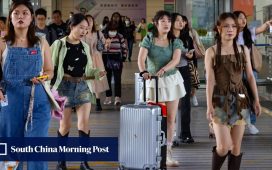He added the industry also tended to hire less-experienced staff and provide on-the-job training.
“Complaints about declining service quality have already surfaced,” Lam said.
“The persistent pay gaps are likely to drive more experienced workers towards other sectors, exacerbating the problem”
A Post study of census statistics spanning five years and 21 industries found that retail and travel sector workers had benefited least from the post-coronavirus economic recovery.
The figures showed retail workers received a total pay rise of 0.71 per cent in median income between 2019 and 2023, while staff in the travel sector got a salary increase of 1.31 per cent over the same period.
The Post study revealed that 2023 marked a return to pre-pandemic pay levels for all industries covered in the survey, although the retail sector was still close to the bottom of the heap.

Lam warned the wage squeeze could create a vicious circle where employers became less prepared to offer generous packages amid sluggish economic growth and increasing rents.
“Fewer good staff, poorer service quality – this could directly impact tourists’ overall experience in Hong Kong, regardless of the government’s efforts in other areas,” Lam said.
A Census and Statistics Department survey published on March 25 showed employees in the city earned a median income a month of HK$19,800 (US$2,530) in mid-2023.
The figure represented year-on-year growth of 3.5 per cent, higher than the median incomes of HK$14,100 a month in retail and HK$15,500 a month in the travel sector.
Hong Kong’s economy, battered by the effects of the pandemic, contracted for two years in a row – by 1.2 per cent in 2019 and 6.1 per cent in 2020.
Consumer spending and tourism-related sectors were particularly hard-hit.
The median income per month for retail staff stood at HK$14,000 in 2019. The figure dropped to HK$13,500 in 2021 before a slight increase to HK$13,800 a year later.
No Easter joy for Hong Kong retailers as trade group warns of tough times
No Easter joy for Hong Kong retailers as trade group warns of tough times
The number of retail establishments increased to 3,171 over the five-year window.
But the number of staff employed in the sector fell from 261,058 in December 2019 to 245,680 in the same month last year.
People working in travel agencies, reservation services and related industries had the second-lowest wage rise over the period.
Their pay went up from HK$15,300 a month to HK$15,500 a month – 1.31 per cent.
But staff in finance and insurance, food processing, care of the elderly, and courier services recorded the highest increase, more than 11 per cent over the five years.
Employees in those sectors enjoyed annual pay rises despite the contraction of the economy.
Those in finance and insurance earned a median income per month of HK$31,600, 60 per cent higher than the city’s median.
Alexa Chow Yee-ping, the managing director of AMAC Human Resources Consultants, said the poor pay rise for the retail and tourism sectors was related to their slow rate of post-pandemic recovery.
She suggested travel agencies should revise their business strategy in a bid to boost business levels.
“For travel agencies, it is important to figure out what people really want and diversify the products – maybe some new routes and special tours,” Chow said.
Hong Kong retail sales grow 16.2% in 2023, bouncing back from contraction
Hong Kong retail sales grow 16.2% in 2023, bouncing back from contraction
She added that younger people tended to book flight tickets and hotels on their own, so travel agencies could develop more flexible and tailored products, or focus more on packages for older people.
“For destinations that may raise safety concerns, tourists tend to turn to travel agencies for guidance and protection,” Chow explained. “Those areas are where travel agencies can put effort into when designing products.”
Shiu Ka-fai, a legislator representing the wholesale and retail sectors, added that landlords could help retailers out.
“Landlords and developers may consider reducing the rent for retail businesses, which could help those retailers offer cheaper prices and other benefits to attract more customers,” he said.














